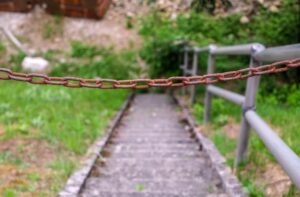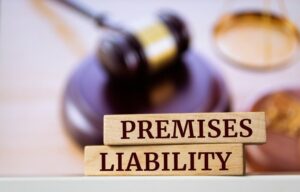Have you suffered an injury while on someone else’s property? Perhaps you got bit by your neighbor’s dog or slipped and fell at the grocery store. When injuries like this happen because of unsafe conditions on the property, you may have a legal case under an area of law called premises liability. Premises liability law deals with property owners’ and occupiers’ responsibilities to keep their property reasonably safe for visitors. If they fail to do so and someone gets hurt, the injured person can sue for compensation for their medical bills, lost income, pain and suffering, and other damages. Let’s examine the key aspects of premises liability law to help you understand your rights. If you suffered injuries, never wait to consult a premises liability attorney near you about a possible claim.
What is a “Premises”?
In premises liability law, a “premises” refers to any property that someone owns or occupies and controls the condition of. It includes all kinds of properties, such as:- Homes
- Businesses and stores
- Restaurants and bars
- Office buildings
- Hotels and resorts
- Schools
- Government buildings
- Parks and recreation areas
- Parking lots and garages
- Construction sites
- Farms and ranches
Duties Owed by Property Owners/Occupiers
Property owners and occupiers (like tenants) have a legal duty to keep their premises reasonably safe for visitors. It means regularly inspecting the property for dangerous conditions, making repairs on time, and warning visitors of any hazards that can’t be immediately fixed. The specific duties owed depend on the type of visitor:Invitees: The Highest Duty of Care
When you enter a property as an invitee, you are owed the highest level of care under premises liability law. Invitees are people who are invited onto a property, usually for the owner’s financial benefit. The most common example is when you go to a store to shop. As a customer, you are an invitee. Property owners must take extra steps to ensure the safety of invitees. It means regularly inspecting the property, quickly fixing dangerous conditions, and warning invitees of any hazards that can’t be immediately repaired. For example, if there’s a spill on a store’s floor, the owner must clean it up right away or put up a clear “wet floor” sign to prevent slips and falls. Other examples of invitees include:- Diners at a restaurant
- Guests at a paid admission event
- Customers at a bank or office
- Contractors hired to do work on the property
- Delivery persons dropping off packages
Licensees: Permission to Enter
Licensees are people who enter a property with the owner’s permission but for their own purposes rather than the owner’s financial benefit. The most common examples are social guests, like friends visiting your home. Property owners have a lower duty of care to licensees than to invitees. They must warn licensees of any dangerous conditions that aren’t obvious, but they don’t have to regularly inspect the property for hazards as they do for invitees. For instance, if a homeowner knows their front steps are cracked and unstable, they should warn visiting friends and family members to watch them. But they don’t necessarily have to repair the steps right away like a store owner would need to fix a broken step that customers use. Other examples of licensees include:- Neighbors attending a backyard barbecue
- Girl Scouts selling cookies door-to-door
- Utility workers reading the meter
- Salespeople making unsolicited visits
Trespassers: Few Protections
 Trespassers are people who enter a property without any right or permission to be there. As a general rule, property owners do not owe any duty of care to adult trespassers. This means they are not responsible for most injuries trespassers suffer on the property.
However, property owners can’t intentionally or wantonly harm trespassers. This means they can’t set traps or deliberately create hazards to injure unwanted visitors, and they can’t use excessive force to remove trespassers from the property.
In some states, property owners may have a limited duty to warn certain trespassers of highly dangerous artificial conditions that aren’t open and obvious, like an abandoned mineshaft. But in most cases, trespassers enter at their own risk.
There is one big exception to the rules for trespassers: children. Property owners may be liable for injuries to child trespassers if there’s an “attractive nuisance” on the property. An attractive nuisance is something that might lure curious kids onto the property and put them at risk, like:
Trespassers are people who enter a property without any right or permission to be there. As a general rule, property owners do not owe any duty of care to adult trespassers. This means they are not responsible for most injuries trespassers suffer on the property.
However, property owners can’t intentionally or wantonly harm trespassers. This means they can’t set traps or deliberately create hazards to injure unwanted visitors, and they can’t use excessive force to remove trespassers from the property.
In some states, property owners may have a limited duty to warn certain trespassers of highly dangerous artificial conditions that aren’t open and obvious, like an abandoned mineshaft. But in most cases, trespassers enter at their own risk.
There is one big exception to the rules for trespassers: children. Property owners may be liable for injuries to child trespassers if there’s an “attractive nuisance” on the property. An attractive nuisance is something that might lure curious kids onto the property and put them at risk, like:
- Swimming pools
- Fountains or ponds
- Trampolines
- Abandoned cars or appliances
- Construction sites or sand piles
Types of Premises Liability Accidents
There are countless ways someone can get hurt on another’s property, but some of the most common premises liability accidents include:Slip and Fall Accidents
Slip, trip, and fall accidents are the most common type of premises liability claim. These can be caused by hazards like:- Wet, slippery floors from spills, leaks, or improper cleaning
- Icy walkways that weren’t cleared or salted
- Loose rugs, mats or floorboards
- Uneven surfaces like cracks in sidewalks
- Cluttered walkways
- Poorly lit stairwells
- Missing or broken railings
- Potholes in parking lots
Inadequate Building Security
Owners of apartment buildings, hotels, office complexes, and other properties are responsible for securing the premises from foreseeable criminal activity. It may include providing:- Adequate lighting in parking lots and common areas
- Security cameras and alarms
- Secure locks on doors and windows
- Security guards or doormen
- Fences or gates around the perimeter
- Background checks on employees with access to rooms
Swimming Pool Accidents
Drowning is a leading cause of unintentional death for children. Property owners with swimming pools, hot tubs, and other water features are responsible for keeping them secure and providing safety equipment and supervision as needed. Pools are considered an “attractive nuisance” likely to attract children, even if trespassing. Therefore, homeowners and public pool operators must take special precautions like fencing, covers, locks, alarms, and clear signage to prevent unauthorized access and accidents.Amusement Park and Playground Accidents
People go to amusement parks, carnivals, fairs, and playgrounds for thrills and recreation, but dangerous conditions can lead to serious injury. The property owner or operator may be liable if accidents occur because of:- Mechanical failures or poor maintenance on rides
- Improper operation by poorly trained employees
- Missing safety equipment like seat belts and harnesses
- Exposed sharp edges or pinch points
- Lack of posted age, height, and weight restrictions
- Failure to inspect and maintain equipment
- Defective design or manufacturing of equipment
- Inadequate supervision, especially of minors
Elevator/Escalator Accidents
We rely on elevators and escalators to safely transport us in multilevel buildings, but malfunctions can result in devastating injuries or death. The building owner and/or elevator maintenance company may be liable for accidents caused by:- Mis-leveling between the elevator and floor
- Defective doors that close too quickly or don’t detect objects
- Falls into the elevator shaft
- Snapped or frayed cables
- Sudden drops or lurching motions
- Getting body parts or clothing caught in escalator steps or gaps
Toxic Fumes or Chemical Exposure
Another major area of premises liability involves toxic substances on a property causing illness or injuries to occupants or visitors. Some common examples include:- Carbon monoxide poisoning from faulty gas appliances or ventilation
- Lead paint exposure in older buildings
- Asbestos exposure during construction or remodeling
- Chemical spills or leaks
- Exposure to toxic mold from water damage or moisture
- Noxious fumes from inadequately ventilated labs or factories
Dog Bites and Animal Attacks
 In most states, dog owners are strictly liable for any injuries their dogs cause, regardless of whether the dog had a history of aggression or the owner did anything wrong. So long as the victim wasn’t trespassing or provoking the animal, the owner is responsible for the resulting medical bills and other damages.
Some states have a “one bite rule” where the owner only becomes strictly liable after a dog has bitten someone previously or otherwise demonstrated vicious tendencies that the owner knew about. Otherwise, standard negligence rules apply.
Property owners may also be liable for attacks by other domestic animals or wild animals allowed to remain on the property if proper precautions aren’t taken.
Ensure you consult a premises liability attorney who handles claims involving the types of accident and injury you experienced.
In most states, dog owners are strictly liable for any injuries their dogs cause, regardless of whether the dog had a history of aggression or the owner did anything wrong. So long as the victim wasn’t trespassing or provoking the animal, the owner is responsible for the resulting medical bills and other damages.
Some states have a “one bite rule” where the owner only becomes strictly liable after a dog has bitten someone previously or otherwise demonstrated vicious tendencies that the owner knew about. Otherwise, standard negligence rules apply.
Property owners may also be liable for attacks by other domestic animals or wild animals allowed to remain on the property if proper precautions aren’t taken.
Ensure you consult a premises liability attorney who handles claims involving the types of accident and injury you experienced.
Proving a Premises Liability Claim
Winning a premises liability case requires proving the following key elements:- The defendant owned/occupied/leased the property;
- The defendant displayed negligent in their use/maintenance of the property;
- You were harmed, and
- The defendant’s negligence was a significant factor in causing your harm.
- Photos of the hazardous condition
- Incident reports
- Witness statements
- Surveillance camera footage, if available
- Maintenance records (or lack thereof)
- Testimony from employees
- Expert opinions on the safety of the premises
- Medical records and bills
- Documentation of lost income
- Psychiatric records if claiming emotional injuries
- Photos of scars, disfigurement, or disability
- Evidence of any pre-existing conditions aggravated
